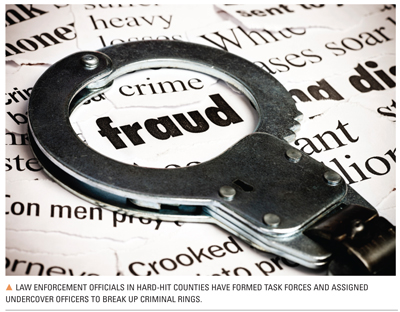 PIP fraud has a lot of people complaining but not enough of them doing anything about it. Slick plaintiff lawyers and so-called consumer groups have so demonized auto insurance companies that it has become difficult to convince voters and legislators that action is needed now.
PIP fraud has a lot of people complaining but not enough of them doing anything about it. Slick plaintiff lawyers and so-called consumer groups have so demonized auto insurance companies that it has become difficult to convince voters and legislators that action is needed now.
The advertising and public relations assault has hidden the truth about PIP fraud in Florida:
- Tampa Bay, Orlando, and South Florida are among the worst markets in the nation for staged accidents and PIP fraud.
- The fraud tax was $50 per driver last year. For United Auto Insurance Co. customers in Miami-Dade County, the figure is closer to $500 because non-standard drivers bear the brunt of fraud costs.
- Insurance companies settled almost 20,000 PIP-related lawsuits in 2010 and had another 10,000 pending at year-end. Each of those figures totaled 5,000 or less in 2007.
- Since 2004, the average claim paid out for PIP claims has gone up 22 percent.
- Florida drivers pay higher premiums than those in other states, about $1,055 annually here versus $789 nationally. Remove the large rural areas of the state from the equation, and Florida is probably the most expensive state in the country.
Sadly, the Florida Legislature did nothing to address PIP fraud in the 2011 session. Representatives and senators went before the media to declare that PIP and accident fraud were major issues and that they were committed to eliminating abuses. Yet for all their talk, they passed none of the legislation important to the Florida insurance industry. Most bills died in committee, and the few that made it to the floor were either watered down or voted down.
Trial lawyers, doctors, chiropractors, medical clinics, and others who benefit the most from PIP locked arms to blockade every reform that would hurt their pocketbooks. Rather than acknowledge there is a fraud problem and work honorably toward a solution, they lobbied against all bills.
Recommended For You
Want to continue reading?
Become a Free PropertyCasualty360 Digital Reader
Your access to unlimited PropertyCasualty360 content isn’t changing.
Once you are an ALM digital member, you’ll receive:
- Breaking insurance news and analysis, on-site and via our newsletters and custom alerts
- Weekly Insurance Speak podcast featuring exclusive interviews with industry leaders
- Educational webcasts, white papers, and ebooks from industry thought leaders
- Critical converage of the employee benefits and financial advisory markets on our other ALM sites, BenefitsPRO and ThinkAdvisor
Already have an account? Sign In Now
© 2025 ALM Global, LLC, All Rights Reserved. Request academic re-use from www.copyright.com. All other uses, submit a request to [email protected]. For more information visit Asset & Logo Licensing.








